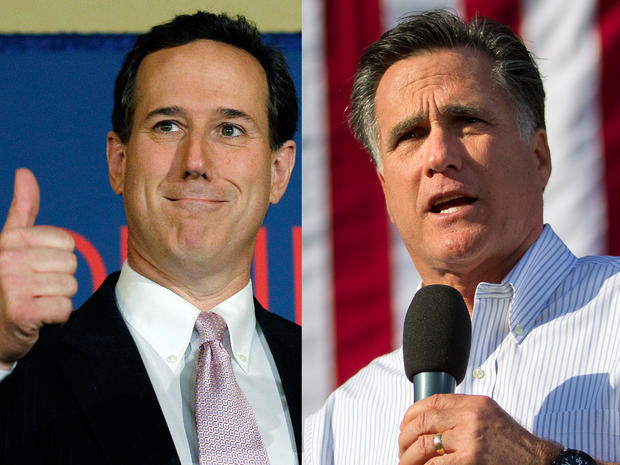As Gingrich fades, GOP race becomes two-man fight
Analysis
Before Newt Gingrich emerged Tuesday night in Birmingham to address supporters following his losses in Mississippi and Alabama, his wife Callista introduced him as "the next president of the United States."
At this point, you have to wonder if even she still believes it.
Gingrich has won just two states in this primary process, and on Tuesday night he lost the two contests that he needed to win to have any chance to rejuvenate his campaign. Rick Santorum has now unambiguously claimed the mantle of consensus conservative alternative to Mitt Romney, and the race has now been transformed into a two-man battle for delegates, with Gingrich and Ron Paul on the outside looking in.
That's not how Gingrich says he sees it, of course. In his remarks Tuesday, he dismissed the "elite media" for the coming calls to drop out and vowed to stay in the race until the nominating convention. However, it's worth noting that the most important calls for Gingrich to exit will likely come not from the media, but the conservative establishment, which will now rally unambiguously behind Santorum.
Despite losses, Gingrich vows to stay in the race
If Gingrich manages to stay in the race - and it's not at all clear after Tuesday night that he'll be able to raise enough money to do so for all that much longer - it's good news for Romney, who has benefited greatly from Santorum and Gingrich splitting the conservative vote.
Romney got ahead of himself before Tuesday night, predicting victory in a pair of states that he knew were an uphill climb for him and even suggesting Santorum had reached the "desperate end of his campaign." Alabama and Mississippi are deeply conservative Southern states where more than three in four GOP primary voters identify as evangelical or born again Christians; one has to wonder why a Northeastern, Ivy-League educated Mormon with a reputation as a moderate decided to raise expectations ahead of election day.
Santorum says Alabama, Mississippi results "greatly" exceeded his expectations
Still, it would be a mistake to overstate the negative impact Tuesday's results will have on the frontrunner. For starters, both states award delegates proportionately, which means that Santorum's wins will barely dent Romney's delegate lead over his rivals. And the exit polls showed that even though Santorum won, Republican primary voters continue to overwhelmingly see Romney as the most likely to beat President Obama in the fall. If Santorum can't convince them otherwise, it's hard to imagine him catching Romney in the delegate fight - particularly with most of the coming races also awarding delegates proportionately, with the exception of four contests that seem to favor Romney.
Then there's the money factor. Romney and his super PAC backers continue to massively outspend the other candidates, prompting Santorum to complain Tuesday night that "for someone who thinks this race is inevitable, he spent a whole lot of money against me." Romney's organizational and financial advantage has allowed him to take delegates in obscure contests (hello, Northern Marianas Islands) and to move the needle just enough in competitive races (Ohio, Michigan) to avoid disaster.
Santorum has been able to make more of a connection with Republican primary voters, particularly those who identify as highly religious and conservative. But as 2008 also-ran Mike Huckabee will tell you, that's not necessarily enough to win the Republican presidential nomination. Santorum noted ruefully Tuesday night that "all the establishment [is] on the other side" in the race - and while the Republican establishment's backing isn't worth as much as it used to be, it's still awfully hard for a candidate to overcome.
How Santorum won the Mississippi primary
How Santorum won the Alabama primary
With Gingrich now seeming to be effectively out of the race, Santorum now has the head-to-head battle against Romney he has long called for. Both Santorum and Gingrich have argued that the anti-Romney vote is big enough that once conservatives rallied around one of them, it will be enough to put them over the top. Even if that's true, however, it might be too late for it to matter; as the Romney campaign has been eager to point out to reporters, the non-Romney candidates would have to dominate Romney in the coming contests to win the 1,144 delegates necessary to reach the nomination, and that almost certainly isn't going to happen.
As Santorum's campaign has acknowledged, Santorum's best shot now seems to be for Santorum, Gingrich and Paul to win enough delegates to keep Romney from winning the nomination, thus forcing a contested convention - their hope being that Santorum will emerge as the nominee once the dust settles. That's not impossible to imagine, since a contested convention is uncharted territory in the modern era, but it's hard to envision Republicans passing over a candidate who is both seen as the most electable and who has won more delegates than any other.
One thing that is clear is that the conservative moment is not at all ready to fall in line behind the establishment choice to take on President Obama in the fall. And that means a long, mudslinging march to the nomination that will keep the eventual nominee from focusing on the general election.
Santorum sweeps Mississippi, Alabama primaries
Full Alabama results
Full Mississippi results
